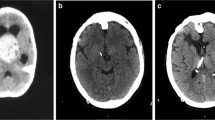Abstract
The purpose of this study was to determine the respective parts played by cerebral hemisphere irradiation, posterior fossa irradiation, and surgery in the poor late functional results often observed in children treated for medulloblastoma. To do this we compared the intellectual outcome in a series of 59 children operated on for medulloblastoma, who had received whole-brain irradiation, to that observed in a series of 37 children operated on for ependymoma of the posterior fossa, who had received radiotherapy only on the posterior fossa. Only patients who had survived for more than 2 years without recurrence were included. At the assessment 1 year after treatment, intellectual outcome was somewhat better in the ependymoma group, but the difference was not statistically significant. At the long-term follow-ups at 5 and 10 years the results remained stable in the children treated for ependymoma, around 60% having an IQ above 90, whereas the intellectual level of the children treated for medulloblastoma was seen to have deteriorated progressively: 20% had an IQ above 90 5 years after treatment and only 10% at the 10-year followup. This progressive degradation is most likely due to the irradiation of the cerebral hemispheres, as this prophylactic irradiation constituted the only difference between the two groups. Moreover, irradiation to the posterior fossa did not seem to affect intellectual functions, since in the group of children with ependymomas the proportion of IQs above 90 was high and remained stable over the years. Surgery was certainly responsible for some poor results. The percentage of IQs above 90 observed 1–2 years after treatment was between 70 and 80 when no postoperative complications occurred, and only between 20–40% in the presence of postoperative complications. Postoperative aggravation was in most cases related to a brain-stem lesion. These results encourage the reduction, when possible, of irradiation to the cerebral hemispheres and underline the importance of the quality of surgery.
Similar content being viewed by others
References
Berry MP, Jenkin RDT, Kun CW, Mair BD, Simpson WY (1981) Radiation treatment for medulloblastoma. A 21 year review. J Neurosurg 55:43–51
Bloom HJG, Wallace ENK, Hen JM (1969) The treatment and prognosis of medulloblastoma in children. Am J Roentgenol 105:43–62
Bloom HJG, Thorton H, Schweisguth O (1982) STOP medulloblastoma and high grade ependymoma therapeutic clinical trial: preliminary results (1975–1981). In: Raybaud C, Clement R. Lebreuil G (eds) Pediatric oncology. (Excerpta Medica international congress series 570) Excerpta Medica, Amsterdam, Oxford Princeton, pp 309–322
Danoff BF, Cowchock FS, Marquette C, Mulgrew L, Kramer S (1982) Assessment of the long term effects of primary radiation therapy for brain tumors in children. Cancer 49:1580–1586
Duffner PK, Cohen ME, Thomas P (1983) Late effects of treatment on the intelligence of children with posterior fossa tumors. Cancer 51:233–237
Glauser TA, Packer RJ (1991) Cognitive deficits in long-term survivors of childhood brain tumors. Child's Nerv Syst 7: 2–12
Hirsch JF, Renier D, Pierre-Kahn A, Beneviste L, George B (1978) Les médulloblastomes de l'enfant. Survie et résultats fonctionnels. Neurochirurgie 24:391–397
Hoppe-Hirsch E (1993) Intellectual and psychosocial complications of posterior fossa tumor surgery and supplemental (radiation therapy/chemotherapy) treatment. In: Raimondi AJ, Choux M, Di Rocco E (eds) Posterior fossa tumors. Springer, Berlin Heidelberg New York, pp 194–200
Hoppe-Hirsch E, Renier D, Lellouch-Tubiana A, Sainte-Rose C, Pierre-Kahn A, Hirsch JF (1990) Medulloblastoma in childhood: progressive intellectual deterioration. Child's Nerv Syst 6:60–65
Jannoun L, Bloom HJG (1990) Long-term psychological effects in children treated for intracranial tumors. Int J Radiat Oncol Biol Phys 18:747–753
Kun LE, Mulhern RK, Crisco J (1983) Quality of life in children treated for brain tumors: intellectual, emotional, and academic function. J Neurosurg 58:1–6
Lampe I, McIntyre RS (1949) Medulloblastoma of the cerebellum. Arch Neurol Psychiatry 62:322–329
Moore BD, Copeland DR, Ried R, Levy B (1992) Neurophysiological basis of cognitive deficits in long-term survivors of childhood cancer. Arch Neurol 49:809–817
Neidhardt MK, Baily CC (1987) Prospective randomized cooperative medulloblastoma trial of the International Society of Pediatric Oncology (SIOP) and of the German Society of Pediatric Oncology (GPO). Child's Nerv Syst 3:70–73
Packer RJ, Sposto R, Atkins TE, Sutton LN, Bruce DA, Siegel KR, Rorke LB, Littman PA, Schut L (1987) Quality of life in children with primitive neuroectodermal tumors (medulloblastomas) of the posterior fossa. Pediatr Neurosci 13:169–175
Packer RJ, Sutton LN, Atkins TE, Radcliffe J, Bunin GR, D'Angio G, Siegel KR, Schut L (1989) A prospective study of cognitive function in childdren receiving whole-brain radiotherapy and chemotherapy: 2-year results. J Neurosurg 70:707–713
Park TS, Hoffman HJ, Hendrick EB, Humphreys RP, Becker LE (1983) Medulloblastoma: clinical presentation and management. J Neurosurg 58:543–552
Paterson E, Farr RF (1953) Medulloblastoma. Treatment by irradiation of the whole central nervous system. Acta Radiol 39:323–336
Raimondi AJ, Tomita T (1979) The disadvantages of prophylactic whole CNS postoperative radiation therapy for medulloblastoma. In: Paoletti P, Walker MD, Butti G, et al (eds) Multidisciplinary aspects of brain tumor therapy. North-Holland, Amsterdam, pp 209–218
Spunberg JJ, Chang CH, Goldman M, Auricchio E, Bell JJ (1981) Quality of long-term survival following irradiation for intracranial tumors in children under the age of two. Int J Radiat Oncol Biol Phys 7:727–736
Author information
Authors and Affiliations
Rights and permissions
About this article
Cite this article
Hoppe-Hirsch, E., Brunet, L., Laroussinie, F. et al. Intellectual outcome in children with malignant tumors of the posterior fossa: influence of the field of irradiation and quality of surgery. Child's Nerv Syst 11, 340–345 (1995). https://doi.org/10.1007/BF00301666
Received:
Issue Date:
DOI: https://doi.org/10.1007/BF00301666




